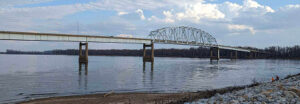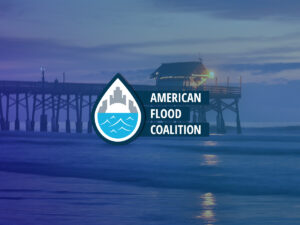
Noah Valenstein Joins American Flood Coalition as Senior Advisor
Former Florida Chief Resilience Officer and Secretary of the Department of Environmental Protection brings wealth of state government and private sector experience to help advance national solutions to flooding and sea level rise
WASHINGTON, DC — July 22, 2021 — The American Flood Coalition today announced that former Florida Department of Environmental Protection (DEP) Secretary and Brightwater Strategies founder Noah Valenstein has joined its growing team as a Senior Advisor. The announcement comes on the heels of the additions of Former Colorado Governor Bill Ritter, Hawaii Public Utilities Commissioner Leo Asuncion, and Blue Meridian Partners’ Laurel Blatchford to the Coalition’s Executive Advisory Board.
“In this already active storm season, state leaders nationwide are seeking innovative strategies to address flooding,” said Melissa Roberts, Executive Director of the American Flood Coalition. “We are pleased to welcome to AFC Noah Valenstein, a Florida leader I have enjoyed working with over the past years. With his deep experience in flood resilience and state government, he will help us lead in finding proactive solutions to frequent flooding and rising seas.”
As the first Secretary for the Florida Department of Environmental Protection to serve two consecutive governors, Valenstein advocated for water quality improvements, Everglades and springs restoration, coastal resiliency, and conservation of Florida’s prized properties. As the second Chief Resilience Officer in state history, he led the creation of the Office of Resilience and Coastal Protection at DEP, further strengthening resilience in Florida communities and throughout the country.
Valenstein is the founding partner of the consulting firm Brightwater Strategies, where he provides guidance, lobbying, and external affairs support to public and private sector clients.
Noah Valenstein joins an esteemed slate of Senior Advisors at American Flood Coalition, including George Bandy Jr., Board Member for Green Business Certification Inc.; Jim Cason, Former Mayor of Coral Gables; Joyce Coffee, founder and President of Climate Resilience Consulting; Jake Johansson, co-founder of Core Concepts Leadership; Chuck Porcari, Board Chair of the Maryland League of Conservation Voters Education Fund; Josh Sawislak, Distinguished Senior Fellow of the Global Resilience Institute (GRI) at Northeastern University; Richard Seline, Executive Director of Texas-based AccelerateH2O; and Chauncia Willis, CEO and Co-Founder of the Institute for Diversity and Inclusion in Emergency Management (I-DIEM).
###
About the American Flood Coalition
The American Flood Coalition is a nonpartisan group of cities, elected officials, military leaders, businesses, and civic groups that have come together to drive adaptation to the reality of higher seas, stronger storms, and more frequent flooding through national solutions that support flood-affected communities and protect our nation’s residents, economy, and military installations. The Coalition has over 260 members across 20 states.
Cities, towns, elected officials, businesses, and local leaders wishing to join the American Flood Coalition or read more about the organization’s work can visit the Coalition’s website (www.floodcoalition.org) to find out more.



